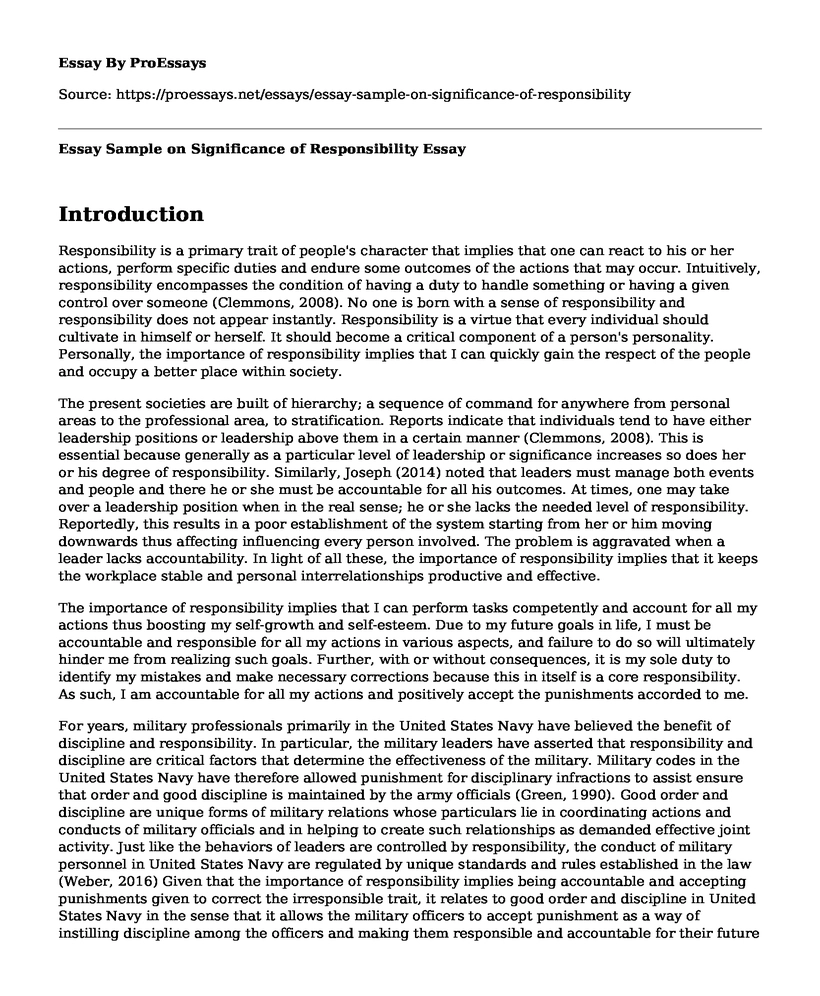Introduction
Responsibility is a primary trait of people's character that implies that one can react to his or her actions, perform specific duties and endure some outcomes of the actions that may occur. Intuitively, responsibility encompasses the condition of having a duty to handle something or having a given control over someone (Clemmons, 2008). No one is born with a sense of responsibility and responsibility does not appear instantly. Responsibility is a virtue that every individual should cultivate in himself or herself. It should become a critical component of a person's personality. Personally, the importance of responsibility implies that I can quickly gain the respect of the people and occupy a better place within society.
The present societies are built of hierarchy; a sequence of command for anywhere from personal areas to the professional area, to stratification. Reports indicate that individuals tend to have either leadership positions or leadership above them in a certain manner (Clemmons, 2008). This is essential because generally as a particular level of leadership or significance increases so does her or his degree of responsibility. Similarly, Joseph (2014) noted that leaders must manage both events and people and there he or she must be accountable for all his outcomes. At times, one may take over a leadership position when in the real sense; he or she lacks the needed level of responsibility. Reportedly, this results in a poor establishment of the system starting from her or him moving downwards thus affecting influencing every person involved. The problem is aggravated when a leader lacks accountability. In light of all these, the importance of responsibility implies that it keeps the workplace stable and personal interrelationships productive and effective.
The importance of responsibility implies that I can perform tasks competently and account for all my actions thus boosting my self-growth and self-esteem. Due to my future goals in life, I must be accountable and responsible for all my actions in various aspects, and failure to do so will ultimately hinder me from realizing such goals. Further, with or without consequences, it is my sole duty to identify my mistakes and make necessary corrections because this in itself is a core responsibility. As such, I am accountable for all my actions and positively accept the punishments accorded to me.
For years, military professionals primarily in the United States Navy have believed the benefit of discipline and responsibility. In particular, the military leaders have asserted that responsibility and discipline are critical factors that determine the effectiveness of the military. Military codes in the United States Navy have therefore allowed punishment for disciplinary infractions to assist ensure that order and good discipline is maintained by the army officials (Green, 1990). Good order and discipline are unique forms of military relations whose particulars lie in coordinating actions and conducts of military officials and in helping to create such relationships as demanded effective joint activity. Just like the behaviors of leaders are controlled by responsibility, the conduct of military personnel in United States Navy are regulated by unique standards and rules established in the law (Weber, 2016) Given that the importance of responsibility implies being accountable and accepting punishments given to correct the irresponsible trait, it relates to good order and discipline in United States Navy in the sense that it allows the military officers to accept punishment as a way of instilling discipline among the officers and making them responsible and accountable for their future aspirations.
References
Clemmons, S. (2008, December 23). Why Personal Responsibility Is Important for Life Success. Retrieved March 15, 2019, from https://www.livestrong.com/article/14698-accepting-personal-responsibility/
Green, L. G. (1990). Superior orders and command responsibility. Canadian Yearbook of International Law/Annuaire Canadien de droit international, 27, 167-202.
Joseph, A (2014).The Need for Personal Responsibility and Integrity in Corporate Social Responsibility Theories. International Journal of Recent Advances in Organizational Behavior and Decision Sciences, 1(1), 45-65
Weber, J. S. (2016). The Disorderly, Undisciplined State of the Good Order and Discipline Term. Air War College Maxwell AFB United States.
Cite this page
Essay Sample on Significance of Responsibility. (2022, Dec 13). Retrieved from https://proessays.net/essays/essay-sample-on-significance-of-responsibility
If you are the original author of this essay and no longer wish to have it published on the ProEssays website, please click below to request its removal:
- Essay Sample on Human Trafficking and Suicide
- Memory Research Paper Example
- Treatment of Rapists as Sex Offenders Using Cognitive Behavioral Technique (CBT)
- Unraveling the Mystery of Creativity: Beyond Logic & Imagination - Essay Sample
- Essay Example on 5 Keys to Social Entrepreneur Success: Lluis Pareras TED Talk
- Mental Health Issues: Lack of Recognition and Prevention - Essay Sample
- Paper Example on Teaching Success: Managing Classroom Env to Maximize Student Performance & Behavior







